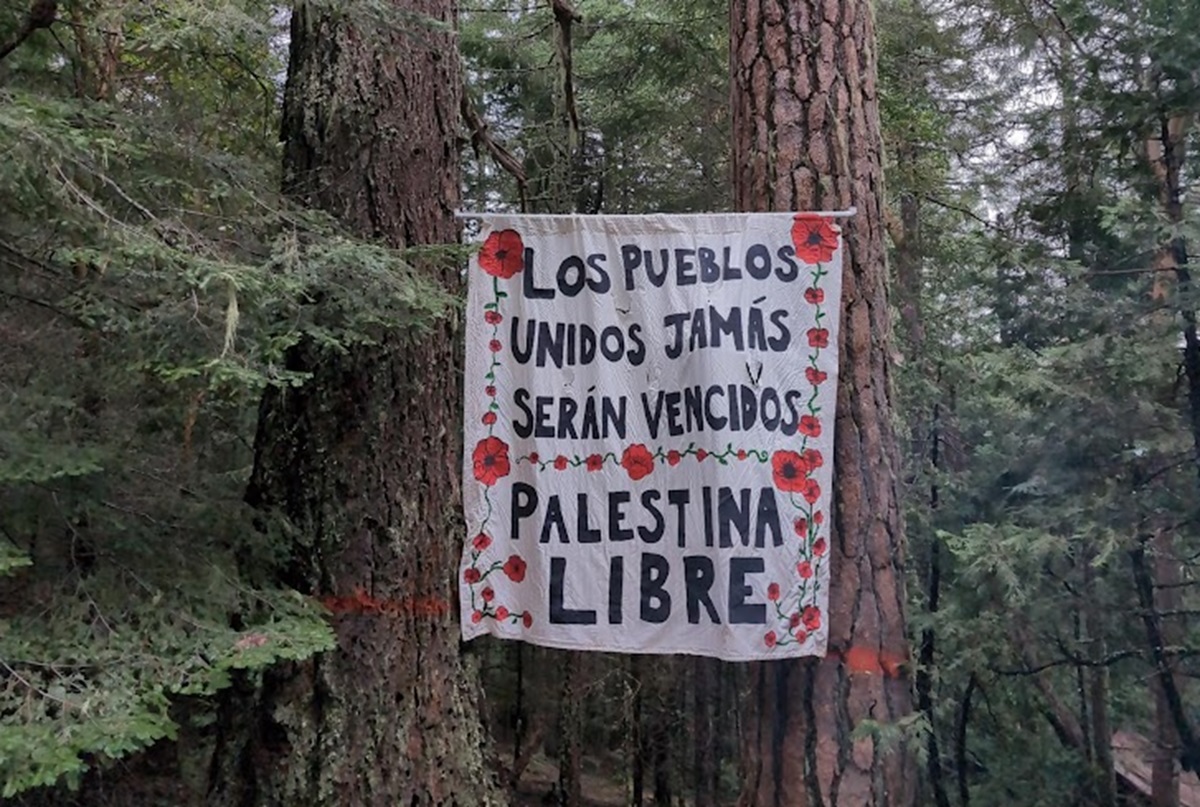Filed under: Action, Environment, Land, Northwest

Report on ongoing Poor Windy tree-sit in Southern Oregon. For more updates, follow the Tree Sitter’s Union Media Collective.
In a sign that the agency is feeling growing pressure as a tree sit on a proposed timber sale enters its second week, the BLM unexpectedly cancelled the Baker’s Dozen project, another contentious mature and old growth logging proposal in Southern Oregon. The Baker’s Dozen project targeted over one thousand acres for aggressive logging, with stands of trees over 300 years old.
“The BLM can no longer ignore the widespread opposition to the agency’s mature and old growth logging projects. The cancellation of the Baker’s Dozen timber sale is a direct response to the countless community members and conservation organizations that have organized, commented, litigated and protested against these destructive projects,” said Rachel Stevens, a community activist with the tree sit. “And, of course, the threat that tree sitters like us might decide to set up more blockades.”
The tree sitters hung a banner in solidarity with the economic blockades of A15, reading “Los Pueblos Unidos Jamás Serán Vencidos – Palestina Libre”.
In a statement, the tree sitters tied the ongoing blockade of old growth logging to the genocide in Palestine: “State agencies such as the BLM selling corporations permission to extract profits from this land is a form of colonial violence. We view the actions we’re taking here to stop extractive industry and challenge the political and economic structures that enable it as one very small piece of a broader struggle against colonization and state violence.
The Biden Administration has committed to ending the practice of old growth logging on public lands, and the BLM is currently considering a rulemaking to establish greater protections for intact ecosystems, yet projects targeting mature and old growth forests continue to be implemented across the region. The Poor Windy project would log more than 15,000 acres, including 4,573 acres of mature and old-growth trees that are essential nesting, roosting and foraging habitat for the threatened northern spotted owl and many other species.
Concerned about the impacts of logging, which increases wildfire risk, impacts clean water, and drives climate change, community members started their occupation of old growth forests in the Poor Windy project on April 1 and have no plans to leave.
“The single largest threat to the remaining mature and old-growth forests on public land in Oregon are the agencies that are supposed to be protecting them” says Sam Shields, a community organizer supporting the tree sit. “This tree sit is exposing the inexcusable malpractice of the BLM. While politicians in Washington D.C. wax poetic about the importance of fighting climate change and protecting the environment, the chainsaws continue to run and these priceless ecosystems are being leveled faster than ever. We are the last line of defense for these priceless forests.”
Research has shown that industrial logging also increases wildfire severity and frequency by replacing fire resilient mature and old growth forests with mono-crop timber plantations, increasing threats to rural communities like the one around this sale. The project specifically targets old growth forests with proposed road construction, an increasingly common tactic used by the BLM to avoid regulatory oversight.
Poor Windy has been approved and there is active logging already taking place in some areas. The contentious project is one of countless sales being moved forward by the BLM despite legal challenges and criticisms about the impacts that they will have on habitat, wildfire, fresh water, and the climate. Studies have shown that Oregon’s forests are some of the most carbon-rich in the world, and that logging is the State’s single largest source of carbon emissions.
“Public forests are needed for public benefits, like carbon storage and wildfire resilience,” said Francis Eatherington, a long-time forest activist and Douglas County resident. “Instead they are being logging for private profit, lining the pockets of the timber millionaires at the expense of rural Oregonians.”
The logging will impact freshwater sources in the area, with streams and the fish that depend on them already being compromised by severe sedimentation from more than 320 miles of logging roads in the area. Additionally, studies have shown significant long-term decreased summer stream flows in areas converted from mature and old-growth forests into plantations.





